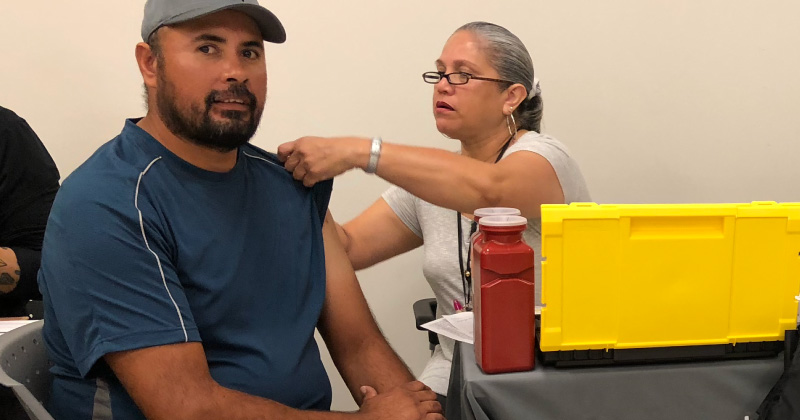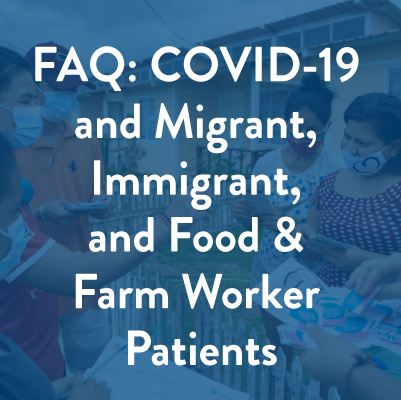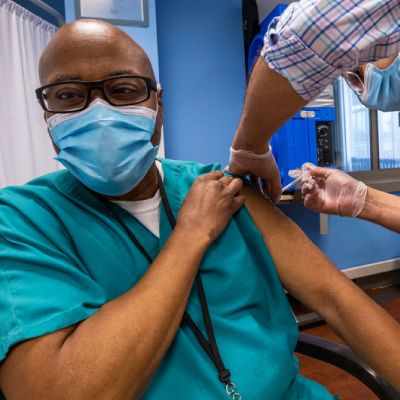- Who We Are
- Clinician Employment
- Publications
- Witness to Witness (W2W)
- Kugel & Zuroweste Health Justice Award
- Your Voice Matters: Photovoice Project
Wed, 10/14/2020 | by MCN Admin


A health fair attendee receives an immunization at the Mexican Consulate in Austin, Texas.
The COVID-19 vaccine may not be ready for initial distribution for many months, but health authorities have begun to prepare for it. In many communities, obstacles and aversion to immunization may increase already-existing disparities in vaccine provision. In a new article, published in the Hispanic Journal of Behavioral Sciences, Nelly Salgado de Snyder, DSW, who spent a sabbatical year with Migrant Clinicians Network, collaborated with MCN’s Deliana Garcia, Director of International Projects and Emerging Issues; Roxana Pineda, MPH, Ventanilla de Salud Coordinator and Health Network Associate; Jessica Calderon, International Projects and Emerging Issues Associate; and MCN interns Dania Diaz, Alondra Morales, and Brenda Perez, to determine why Mexican adult males visiting the Mexican Consulate do not get vaccinated -- and the implications for COVID-19 preventative actions.
“This was a great opportunity to complete some much-needed research on immunizations by taking the time to survey men who were not focused on health care concerns and ask their honest opinions about what motivates them and other men,” said Garcia.
Latinxs have the lowest rates of vaccination in the United States, yet many Latinx immigrants work in occupations, like agriculture and construction, that put them at higher risk for communicable diseases and work injury. Additionally, access to affordable health care including for immunizations remains limited for immigrants overall, particularly those who lack authorization to live and work in the US.
In the study, the MCN researchers asked short multiple choice and open-ended questions in Spanish of 401 adult males, most of whom were waiting for services at the Mexican Consulate in Austin, Texas, where MCN partners with the Ventanilla de Salud to promote health services for visitors to the Consulate. (See sidebar on the Ventanilla de Salud.) The majority of the participants, with a mean age of 40, had on average not received a vaccine for over five years. Of those who had not received a vaccination in over five years, over half indicated not getting vaccines because “they were healthy, they felt well, and they were not sick.” One quarter of participants said they didn’t have time to get a vaccine. Despite this, most participants indicated that they believed vaccines were equally important for men as for children and women.
The final question of the survey was open-ended, asking participants how to make it easier for men to get vaccinated. “Participants responded they needed to be convinced with more accurate information regarding the importance of vaccines through health campaigns/fairs, social media, TV or radio. They also mentioned that if immunizations were easily accessible to them; for example, without interrupting their work, with locations near their work or home, and not having to pay for a vaccine, they would probably be more open to getting vaccinated,” the researchers reported in the study.
Based on the findings, the researchers recommend the development of culturally relevant resources to help Latino men become more informed about vaccination alongside strategic outreach with the resources. Additionally, both educational outreach and vaccination provision opportunities should take into account work schedules and financial limitations of Latino men. Collaborations between employers and health clinics on preventative health care were highlighted as important as well as partnership with the Ventanilla de Salud.
The researchers then connected the immunization disparities to the ongoing COVID-19 crisis, as the public health world begins to gear up for a vaccine. “Vaccines, but particularly COVID-19 immunizations, must be considered a global public good,” the researchers concluded. “In other words, access to preventive medicine and vaccinations is for everyone, regardless of their nationality, racial or ethnic background, legal status, gender and age.”
Read the article here: “Exploring Why Adult Mexican Males Do Not Get Vaccinated: Implications for COVID-19 Preventive Actions,” at the Hispanic Journal of Behavioral Sciences:
https://doi.org/10.1177%2F0739986320956913
What Is the Ventanilla de Salud?
Ventanilla de Salud (Spanish for Windows of Health) is a program of the government of Mexico to provide health information and access to health resources to visitors to Mexican Consulates throughout the United States. Migrant Clinicians Network has partnered with the Ventanilla de Salud at the Mexican Consulate in Austin, Texas since 2016. Learn more about the partnership here:
https://www.migrantclinician.org/blog/2016/jul/ventanilla-de-salud-and-migrant-clinicians-network%E2%80%99s-new-partnership.html
Ventanilla de Salud (Spanish for Windows of Health) is a program of the government of Mexico to provide health information and access to health resources to visitors to Mexican Consulates throughout the United States. Migrant Clinicians Network has partnered with the Ventanilla de Salud at the Mexican Consulate in Austin, Texas since 2016. Learn more about the partnership here:
https://www.migrantclinician.org/blog/2016/jul/ventanilla-de-salud-and-migrant-clinicians-network%E2%80%99s-new-partnership.html
Like what you see? Amplify our collective voice with a contribution.
Got some good news to share? Contact us on our social media pages above.
Return to the main blog page or sign up for blog updates here.







